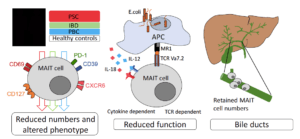
Graphical Illustration: Patients with primary sclerosing cholangitis, a chronic inflammatory disease of the biliary system, have dramatically reduced number of circulating MAIT cells. MAIT cells are further dysfunction in these patients, both in response to cytokine stimulation as well as to bacteria. However, the biliary tract MAIT cell population appears intact. (Seth et al., 2018)
Primary sclerosing cholangitis (PSC) is a chronic hepatobiliary disease characterised by inflammation and fibrosis of the bile duct. The pathogenesis of PSC is unknown, and no medical treatment is available to prevent progression to severe liver disease.PSC is associated with destruction of biliary epithelial cells, cells that present antigen to mucosal-associated invariant T (MAIT) cells which make up 30% of all T cells in the liver. However, the role of MAIT cells in PSC has not to been identified.
Seth and colleagues aimed to characterise the phenotype and function of MAIT cells from patients with PSC. Researchers defined MAIT cells as CD161+Vα7.2 T cells that were either CD8+ or double negative (CD4-CD8-). Researchers used stochastic neighbour embedding (SNE) analysis to compare immune profiles (based on 13 parameters) between healthy individuals and PSC patients. SNE is a dimensionality reduction method that generates two-dimensional representations of multi-dimensional data. This method enables you to find unbiased differences between two of more samples. Based on this analysis immune cells from PSC patients have higher expression of CD69, CD56 and NKG2D, and lower expression of CD28, CD127 and CXCR6 than healthy controls.
Researchers observed lower blood circulating frequencies of MAIT cells in PSC patients compared with health controls. Surprisingly, no differences in the number of MAIT cells in the bile duct were observed between the two groups. Researchers, observed impaired functional activity of MAIT cells from PSC patients (compared with healthy controls), characterised by reduced levels of CD107a, TNF, IFNg and CD69. This impaired function was MR1 restricted and not due to loss of bystander activation by IL-12 and IL-18.
In summary, von Seth et al., reported that PSC is associated with significant reduction of MAIT cells in the periphery and functional impairement of these cells. Interestingly, proportions of MAIT cells in the bile ducts were unaltered, the significance of this finding is yet to be determined.
Journal Article: Seth et al., 2018. Primary sclerosing cholangitis leads to dysfunction and loss of MAIT cells. European Journal of Immunology.
Article by Cheleka AM Mpande










